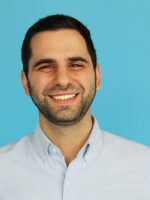
Chris Benderev
Chris Benderev is a founding producer of and also reports stories for NPR's documentary-style podcast, Embedded. He's driven into coal mines, watched as a town had to shutter its only public school after 100 years in operation, and, recently, he's followed the survivors of a mass shooting for two years to understand what happens after they fade from the news. He's also investigated the pseudoscience behind a national chain of autism treatment facilities. As a producer, he's made stories about ISIS, voting rights and Donald Trump's business history. Earlier in his career, he was a producer at NPR's Weekend Edition, Morning Edition, Hidden Brain and the TED Radio Hour.
-
We've all heard the adage that "power corrupts," but psychologist Dacher Keltner at UC Berkeley has found evidence to prove it. His book is The Power Paradox: How We Gain and Lose Influence.
-
Researcher Dan Gilbert says that human beings are the only animals that think about the future. But we don't always do the best job at predicting what will make us happy — or even who we will be.
-
With the Olympics in full swing, we look at the myriad ways losing a competition can wreak havoc on our physical and mental health.
-
The rush of victory or crush of defeat in the Olympics can flash by very quickly. But if you slow those moments down, there's a lot to learn about human behavior.
-
Summer vacations often take time, energy and money to plan. Expectations can run unreasonably high. This week, we dive into what social science research says about how to have a better getaway.
-
Shankar talks with psychologist Jean Twenge about narcissism, millennials, and the rise of "me" culture.
-
Derek Amato wasn't born a musical savant. He became one—almost instantly—after hitting his head on the bottom of a swimming pool.
-
Scientists want to make computers into better storytellers, but to do that they have to teach the machines a tricky element: suspense. Now researchers believe they've taken a big step forward.
-
When you have to remember many things at once, you might try to juggle all those to-do items in your head simultaneously. But new scientific research suggests there might be a better approach.
-
The photographer, who died last month, has a famous portfolio of arresting images. Among them is a shot of two children in 1990. Amanda thought the photo shoot would change her life. It did not.








